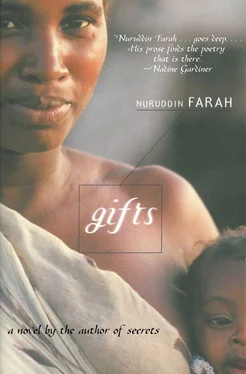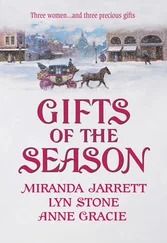Nuruddin Farah - Gifts
Здесь есть возможность читать онлайн «Nuruddin Farah - Gifts» весь текст электронной книги совершенно бесплатно (целиком полную версию без сокращений). В некоторых случаях можно слушать аудио, скачать через торрент в формате fb2 и присутствует краткое содержание. Год выпуска: 2011, Издательство: Arcade Publishing, Жанр: Современная проза, на английском языке. Описание произведения, (предисловие) а так же отзывы посетителей доступны на портале библиотеки ЛибКат.
- Название:Gifts
- Автор:
- Издательство:Arcade Publishing
- Жанр:
- Год:2011
- ISBN:нет данных
- Рейтинг книги:3 / 5. Голосов: 1
-
Избранное:Добавить в избранное
- Отзывы:
-
Ваша оценка:
- 60
- 1
- 2
- 3
- 4
- 5
Gifts: краткое содержание, описание и аннотация
Предлагаем к чтению аннотацию, описание, краткое содержание или предисловие (зависит от того, что написал сам автор книги «Gifts»). Если вы не нашли необходимую информацию о книге — напишите в комментариях, мы постараемся отыскать её.
Gifts — читать онлайн бесплатно полную книгу (весь текст) целиком
Ниже представлен текст книги, разбитый по страницам. Система сохранения места последней прочитанной страницы, позволяет с удобством читать онлайн бесплатно книгу «Gifts», без необходимости каждый раз заново искать на чём Вы остановились. Поставьте закладку, и сможете в любой момент перейти на страницу, на которой закончили чтение.
Интервал:
Закладка:
Abshir pondered for a moment, as if unsure where in the world he was, and then said, “I was meaning to get to the car hire agency as soon as I could. How will you move around if you lend me yours?”
“I have a taxi as my fall-back when I have no transport,” said Bosaaso.
Duniya was called, and she, Bosaaso and Abshir thought about the best way to handle this. The fact that Nasiiba stayed out of this didn’t pass unnoticed.
“What do you suggest, Duniya?” Abshir said.
Duniya suggested that Mataan go with them to show Abshir the way back.
“Shall we go for a drive, you and I?” said Abshir. “When I come back?”
“That’s a lovely idea,” said Duniya.
Nasiiba was clearly excited, and she slid in and out of joyous moods. At one point, in fact as soon as she and her mother were let alone, she came out to where Duniya was sitting, wearing a fashionable outfit Abshir had brought her. Sounding high-strung, she spoke what amounted, in her mother’s opinion, to a non-sequitur, saying, “Have you noticed of late how many dogs there are in any African city? Dogs roaming around the streets in packs, full of menace like wolves let out of a zoo? You see them everywhere, foraging in the very garbage bins the urchins have emptied of everything except the bones they cannot chew; these dogs attack pedestrians minding their own business, especially after dark. Have you any idea where these terrifying beasts come from?”
Duniya didn’t seem moved and remained non-committal.
“According to Taariq,” Nasiiba continued, “most of these dogs at one time or another belonged to Europeans or Americans with plenty of food to spare and human affection to indulge on these beasts that actually live in the same spacious and well-to-do houses as their children. Now the truth is, these dogs received more food and attentive love than most Somalis, and then, between one weekend and the next, the masters went home, leaving behind these spoiled creatures. This has been a pattern, too much love, then with frightening suddenness, homelessness and a hostile Islamic community ready to stone them on the slightest pretext. In short, the dogs are turned into schizoids.”
“What are you driving at, Nasiiba? Please come to the point!” Duniya said.
Then Nasiiba paused for a long while. Finally she said, “This is that level of reality in which you might discern a certain similarity between dogs and some Third World dictators who receive the pampered approval of their European and American masters until their usefulness has ceased, dictators who are abandoned to the dogs of bad fortune. On a personal level, the Europeans and Americans living in Africa behave in a manner akin to that of their governments on a national level. What I am trying to say…”
Duniya’s body stiffened. Glaring at Nasiiba, she demanded, “Do you think I am thick?”
“Why?”
“I am not thick!” said Duniya. “That’s all.”
Puzzled, Nasiiba stared at her mother who was leaving the room to prepare herself for the drive with Abshir.
Abshir was at the wheel, driving in an easterly direction, towards the sea. “You can’t imagine how much I missed seeing, swimming in or being near the Indian Ocean,” he said.
She watched him drive. He was a chimney and was smoking out his lungs; and his whole body, now and then, exploded, turning pale like unburied ashes left overnight in a brazier. She began to wonder why Mataan had always reminded her of Abshir, although the two didn’t resemble each other physically. She had never seen their own grandfather, but thought that his nickname was indicative of a stoop, his nickname being Tuerre, meaning the man with the hump. She told herself that certain physical characteristics run in some families, jumping hopscotch-style from one generation to another.
“Tell me a little about Bosaaso,” he said.
“We’re thinking of getting married.”
“Is anything in the way?” Abshir asked, as if he wished to get it removed, whatever it was. They both thought about Shiriye, although neither invoked his accursed name.
“He proposed; I asked for time to think it over.”
“Are you still thinking? Or have you decided?”
“I’ve been turning it over and over in my mind, now the answer is yes, now no, although mostly it has been yes. I am very fond of him, love him actually in my own way,” she qualified. “He deserves better than I can offer to him. He is too trusting, he has no energy for fighting; I realise I am a bit of a handful.”
“I hope he is aware of what he is in for,” said Abshir with a smile.
“I’m sure he is.”
“He has been rather deferential to me, as in-laws are towards one another. And when we were in his car, taking him home, he suggested I drive. Bosaaso might have been a young man appearing in front of his prospective father-in-law.” Abshir stubbed out a cigarette, only to light another, and continued, “Love has a certain odour which is seldom smelt, only seen. I scented it on arrival and saw it again when I shook hands with him early this afternoon.”
“The reason I didn’t say yes when I could have was that I don’t want to give satanic tongues the opportunity to wag like a dog’s tail and say that I am marrying him for his money and American Green Card,” Duniya said.
“That’s why I spoke to Mataan in his presence, in a sense to assure Bosaaso that your children won’t be a financial burden on him. I will make that absolutely clear at the earliest opportunity Their education, here or abroad, preferably university studies abroad, all these are my responsibility The poor man has spent a quarter of his life raising other people’s offspring.”
Duniya uttered a chuckle, something between a whimper and a worried laugh, and then said, “Thank you.”
“Let it be understood this in no way should put pressure on you to decide either way You do what gives you pleasure. You marry if you want to, you don’t if you don’t wish to. Your destiny is in your hands. But the children’s school fees are my responsibility, and mine alone,” he said.
She choked on tears of her rejoicing and couldn’t speak for a long time. Finally, she said, “I’ve always wondered why it is that I’ve accepted all the gifts you’ve given me, when I fret if others come towards me intending to give me something. Can you tell me why?”
“Because when you were less than an hour old,” he answered, “and you refused to breast-feed and our mother was too unwell to take care of you, it was I who fed you the first drop of milk, a gift you wouldn’t take from anyone else, including our father, the midwife or other women of the neighbourhood.” He paused, placing a wedge of a cigarette between his lips, maybe so as not to smile.
“My first conscious moment when I received the first drop of life into my mouth is thirty-five years away,” she said, “I’ve been a mother three times, married twice, fallen in love once, or I believe I have. What is it that you have that others don’t? There must be something.”
“What about Qaasim: haven’t you been accepting to stay in his flat more or less rent free?” asked Abshir.
“Our deal had been based on an understanding, which got pulled down the instant a misunderstanding between me and his wife Muraayo occurred. That’s now over and I am moving out of his house and life too.”
“What about your relationship with Bosaaso?”
“He’s often been more of a recipient than a giver,” she said.
In the city centre, Abshir was reorienting himself, remembering sights he hadn’t seen for a quarter of a century; Duniya was staring at some of these because they had assumed a certain relevance, in that they reminded her of Bosaaso. Abshir was saying that little had changed since he last walked these streets, a taller building here, a semi-developed plot there, but the grid, pattern and mapping of Mogadiscio had stayed unaltered, especially in the centre. It still had its charm and attraction.
Читать дальшеИнтервал:
Закладка:
Похожие книги на «Gifts»
Представляем Вашему вниманию похожие книги на «Gifts» списком для выбора. Мы отобрали схожую по названию и смыслу литературу в надежде предоставить читателям больше вариантов отыскать новые, интересные, ещё непрочитанные произведения.
Обсуждение, отзывы о книге «Gifts» и просто собственные мнения читателей. Оставьте ваши комментарии, напишите, что Вы думаете о произведении, его смысле или главных героях. Укажите что конкретно понравилось, а что нет, и почему Вы так считаете.











